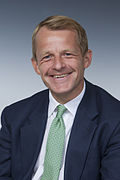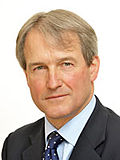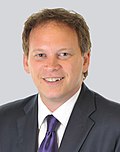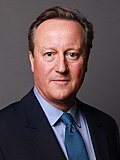Grayling replaces Clarke as Lord Chancellor
Kenneth Clarke, who had served in every Conservative government since Edward Heath made him an Assistant Whip in 1972, retired as Lord Chancellor at the age of 72 after two years, becoming an advisory Minister without portfolio with the right to attend cabinet, the National Security Council, and the important cabinet economic sub-committee. [6] Clarke, who declined Cameron's offer of the Leadership of the House of Commons, [7] explained that when Cameron asked him to become Shadow Business Secretary in 2009, the men agreed that he would serve in the cabinet for two years, and that "At my age, it is time for me to step back from the slog of running a large department, but I am delighted to have been given a more advisory political role". Despite no longer being Lord Chancellor, Clarke maintained responsibility for passage of the Justice and Security Act as Minister without portfolio. [8]
Clarke's retirement from departmental office was viewed as a positive for both right-wingers and Eurosceptics in the Conservative Party, as Clarke was viewed as the Tories' most outspoken Europhile, and had been known as a liberal wet for decades. Clarke was replaced as Lord Chancellor by Chris Grayling, a Eurosceptic who was also considered far less friendly to both the Human Rights Act and European Convention on Human Rights, both constant sources of scorn amongst grassroots Tories. [9] It was also believed that the move would be advantageous to Home Secretary Theresa May, who had sparred with Clarke over the Human Rights Act during "catgate" during the previous October's Conservative Party Conference, and believed to be much closer in ideology to Grayling. [10]
Grayling was initially intended to replace Iain Duncan Smith, his immediate superior as Employment Minister, as Work and Pensions Secretary after Duncan Smith was moved to Lord Chancellor. When Duncan Smith resisted this, insisting that he be allowed to remain due to a fear that his Universal Credit scheme would be watered down by George Osborne's Treasury in his absence, Cameron decided instead to promote Grayling and leave Duncan Smith in place, [11] leading to accusations of weakness from Labour's Shadow Cabinet Office Minister, Michael Dugher. [12]
Grayling's appointment proved immediately controversial due to the fact that he was the first non-lawyer to become Lord Chancellor in centuries. This led to questioning of his ability to adequately perform his functions, such as building relationships with members of the judiciary, [13] and of further politicisation of the judiciary, with Joshua Rozenberg, a popular legal commentator and Queen's Counsel, writing in the Guardian that his "main qualifications are that he is perceived to be right-wing and once shadowed prisons". [14]
Clarke's departmental retirement was met with sadness from many justice related pressure groups, including the Howard League for Penal Reform, which called him a "breath of fresh air", and even from the former Labour First Minister of Scotland, Jack McConnell, who said that he would have merged the Scotland, Wales and Northern Ireland Offices and made Clarke "Secretary of State for Nations" if he were Prime Minister. [15]
McLoughlin replaces Greening at transport
Justine Greening's lateral move from Transport Secretary to International Development was predicted by many, and sparked a late August "Battle for Justine" campaign amongst West London residents, who saw her removal as a shift in government policy in favour of a third runway at Heathrow Airport. [16] Greening, who represents a London constituency, was reported to have responded furiously to the demotion, having "shouted" at Cameron. [17] Greening was replaced by Patrick McLoughlin, the Chief Whip, who represented a constituency in Derbyshire and was "open" to Heathrow development. [18]
Boris Johnson, the Tory Mayor of London and perceived challenger to Cameron, attacked the move, calling Greening a "first rate Transportation Secretary" and saying that the "only reason" for it would be to clear a hurdle to building a third runway. Zac Goldsmith, a backbench London Conservative MP, went even further in attacking Cameron for the apparent U-turn, saying that "real leadership requires clarity" and that the move reflected "panic, not principle". [19]


















